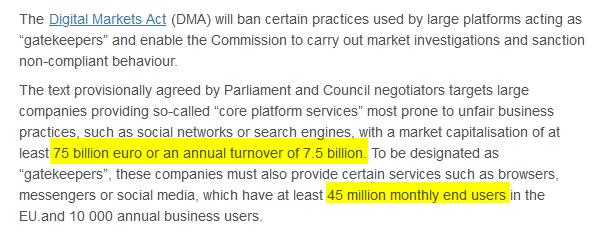Apple and Microsoft are reportedly trying to convince the European Union that iMessage and Bing don't belong in the ‘gatekeeper’ list. The tech giants are in talks with the EU, separately, claiming that their services are not popular enough to fall under the new restrictions.
The EU is expected to publish the list of services that will be regulated by the Digital Markets Act, on Wednesday. Microsoft's Bing search engine and Apple's iMessage chat app are present in the list. Other companies that are said to be on the list include Samsung, Amazon, Meta, Alphabet (Google) and TikTok. Not all services from the companies will be subject to the new rules.
The rules set by the EU will impose strict responsibilities on gatekeepers, which includes interoperability with rival services, linking to competitors, and sharing data.
What's the problem with that? Well, if iMessage was designated as a gatekeeper, Apple would have to add support for RCS in iOS, iPadOS and macOS in order for compatibility with Google Android's Messaging app, and also open up its service to rivals like WhatsApp. Apple has argued that such a move could be detrimental for the security of its users.
Microsoft is not expected to dispute its Windows operating system from being designated as a gatekeeper. But it is a different story with its search engine. Microsoft Bing would have to play nice with Google, if it were to be a gatekeeper. The Redmond company has rejected the claim that Bing should be subject to the restrictions as Google Search, which holds a significantly larger foothold. Bing reportedly has just a 3% market share among search engines. The restrictions imposed by the EU could affect Bing negatively, and in fact help Google's market share. That would be counter-intuitive, considering that these laws are meant to eradicate anticompetitive behavior among the major players.

According to the EU's documentation, there are a couple of criteria that a company should meet to be designated as a gatekeeper. This includes a market capitalization of at least 75 billion euro or an annual turnover of 7.5 billion. In addition to this, gatekeepers must also have at least 45 million monthly end users in the EU, and 10,000 annual business users. A gatekeeper who does not comply with the rules, could incur a fine of up to 10% of its total worldwide turnover in the preceding financial year, and 20% in case of repeated infringements. Systematic infringements could result in a ban for the gatekeeper, which would prevent them from acquiring other companies for a certain time.
Analysts say that iMessage has over 1 Billion users globally, but the actual figure remains a mystery. iMessage is used by the majority of users in the U.S. That's mostly because American service providers offer free/cheap SMS in their plans. That logic, however, does not apply to those in other Countries, such as the regions in the European Union, where SMS isn't free, but data plans are more affordable. While Apple's iPhone has a dominant presence in the mobile market on its home turf, European markets are saturated with tons of budget-friendly Android devices from various companies. So it is not really a surprise that WhatsApp Messenger is the go-to chat app for most users, ahead of iMessage, which is locked behind Apple's walled garden.
So, now the big question is, does iMessage have 45 million monthly users? Only Apple can answer that. The Cupertino company is working on providing options to sideload apps in iOS 17.
The Financial Times reports that the EU is exploring options to determine if iMessage and Bing will be subject to the restrictions set out in the DMA. Gatekeepers designated under the Digital Markets Act will have 6 months to comply with the rules, i.e. the companies will need to have taken steps to follow the new laws by March 2024, or face the punishment.
Thank you for being a Ghacks reader. The post Apple and Microsoft want EU to remove iMessage and Bing from the ‘gatekeeper’ list appeared first on gHacks Technology News.

0 Commentaires